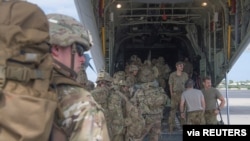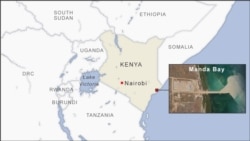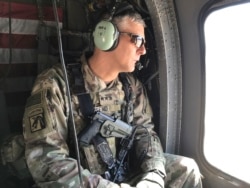The U.S. military says a senior al-Shabab leader behind the deadly Jan. 5 attack on the Manda Bay base in Kenya, was killed Feb. 22 in precision airstrikes, along with his wife.
In a statement, the military says the targeted individuals were identified as members of al-Shabab. The statement did not name the senior al-Shabab leader killed in the strike, but it says he was in charge of planning and directing terrorist operations along the Kenya border region, including the Manda Bay attack.
The statement says the senior leader’s wife also was a “witting and active member of al-Shabab responsible for facilitating a wide range of terrorist activities.”
The only strike reported by the U.S. military Feb. 22 occurred in the vicinity of Saakow, an al-Shabab stronghold in the Middle Juba region. The United States reported that two al-Shabab individuals were killed in that strike.
Three Americans, including a soldier and two contractors, were killed in the Jan. 5 attack when the Manda Bay base was breached by the militants, who also destroyed six aircraft.
“Since Jan. 5, U.S. Africa Command and our partners have pursued those responsible for the attack on U.S. and Kenyan forces at Manda Bay,” said U.S. Army Gen. Stephen Townsend, commander, U.S. Africa Command. “This strike demonstrates that we will continue to relentlessly pursue those responsible for Manda Bay and those wishing to do harm to Americans and our African partners.”
During a hearing last month in the U.S. Congress, General Townsend acknowledged the U.S. military was not well prepared for the attack.
“We were not as prepared there at Manda Bay as we needed to be,” he said. “Al-Shabab managed to penetrate on to that airfield ... killed three Americans and destroyed six aircraft, so we weren’t as prepared, and we are digging into that to find out why that is the case.”
Meanwhile, Somalia’s largest telecommunications company, Hormuud, says one of its employees was killed in Monday’s airstrike near the al-Shabab-held town of Jilib, Middle Juba region.
A spokesperson for Hormuud said the head of the company’s office in Jilib, Mohamud Haji Salad, was killed at his home there. Hormuud says Salad was a civilian who has been working for the company since 2002.
“We confirm that this man was our employee,” says the spokesperson. “He had nothing to do with any group or organization.”
The U.S. reported Monday that in coordination with the Somali government, it has conducted an airstrike in the vicinity of Jilib, killing one al-Shabab member.
“We currently assess no civilians were injured or killed as a result of this airstrike,” the statement read.
The company said it contacted the Somali government Monday night and requested an investigation into the matter.
A spokesperson for AFRICOM said, “We will look into the matter.”
“The command will review any information it has about the incident, including any relevant information provided by third parties,” said the spokesperson. “We comply with the laws of armed conflict and take feasible precautions during the targeting process to strike only legitimate targets tied to al-Shabab.”
VOA National Security Correspondent Jeff Seldin and VOA Pentagon Correspondent Carla Babb contributed to this report.










